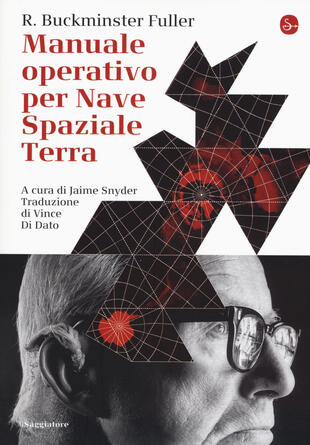

Sinossi
R. Buckminster Fuller, eclettico genio statunitense, affida a questo "Manuale operativo per Nave Spaziale Terra" decenni di riflessioni sul futuro dell'umanità. Messaggi lanciati nello spazio, progetti avanguardistici, profezie destinate a realizzarsi negli anni a venire che rispondono a domande sempre più urgenti: come sopravvivremo alle crisi che stanno sopraggiungendo? come risolveremo i problemi più critici, l'inquinamento, la povertà? Dagli albori della civiltà gli umani hanno dovuto specializzarsi in occupazioni e conoscenze sempre più vaste - dalla scarna illuminazione di una grotta di pochi metri al governo di un regno o di un impero, dalle precarie tecniche di caccia e allevamento a quelle di produzione industriale. Il fascino della conquista ha donato agli abitanti delle terre emerse re, inventori, artisti, mostri, scienziati destinati a possedere un'immaginazione straordinaria e a inseguire i sogni e gli incubi dell'esistenza, mentre miliardi di anonimi individui si sono perfezionati in un ruolo specifico per mandare avanti gli ingranaggi del pianeta. Quando hanno scoperto il mare, gli umani si sono resi conto di quanto modesti fossero i territori fino ad allora esplorati, e una domanda di infinitudine li ha spinti ad abbandonare il proprio status di pedoni per conquistare, come Odisseo, nuove forme di paesaggio e di sapienza. Molto più tardi hanno capito che era possibile abitare anche il cielo, i pianeti, le galassie, l'universo. Davanti a quell'immensità, la vita del pianeta Terra è apparsa ancora più microscopica, la sopravvivenza più che mai minacciata dall'esiguità delle risorse. A guardarla dallo spazio, infatti, la Terra è una sfera sospesa in mezzo a miliardi di altre. È una piccola nave che solca lo spazio, l'umanità il suo timoniere. Che cosa dobbiamo fare noi, ultimi esseri umani, perché questa navicella, oggi in avaria, resista all'inevitabile collasso? Buckminster Fuller mette in discussione il concetto millenario di specializzazione, chiede una rivoluzione progettuale e offre consigli sul modo in cui guidare questa nave spaziale verso un futuro sostenibile. Per farlo, afferma, è indispensabile distogliere il nostro sguardo dalla limitatezza del dettaglio e ammirare il mondo nell'immensità del suo insieme.
- ISBN:
- Casa Editrice:
- Pagine: 172
- Data di uscita: 14-06-2018
Recensioni
I came to this 1969 cult 'classic' in the fervent hope that it might allow me, finally, to 'get' modern environmentalism for which this is a seminal text. Part of my subsequent lack of enthusiasm is down to style. There is no doubt that Buckminster Fuller was a genius of sorts - at least as an engine Leggi tutto
This is a classic, published in 1969, first read by me back in 1970 or 1971, when we thought we would soon experience either the Dawning of the Age of Aquarius or, alternately, the Eve of Destruction. Definitely Utopian, still visionary, and in some ways quite wrong, Fuller makes interesting reading Leggi tutto
I'd be lying if I said I understood much of this book: a lot of it simply went over my head, a fault of either the writing style or my own ignorance. I'll have to re-read it one of these days. What I did understand, though, I agree more often than not.
Incredible to think that this was published in 1969, in the wake of the famous Earthrise photo taken by Apollo 8, with the crew quoting from Genesis on Christmas Day 1968, which is sure one way to guarantee Western Christianity’s hegemony over the planet. Luckily Fuller, inventor of the geodesic dome Leggi tutto
One of Cambridge Sustainability's Top 50 Books for Sustainability, as voted for by our alumni network of over 3,000 senior leaders from around the world. To find out more, click here . Operating Manual for Spaceship Earth is a fascinating combination of Fuller's deep scientific grounding and his philo Leggi tutto
Ο αρχιτέκτονας/εφευρέτης/οραματιστής Buckminster Fuller ανήκει στίς σπάνιες περιπτώσεις ανθρώπων πού η εποχή τούς δεν ήταν έτοιμη για τό μυαλό καί τίς ιδέες τους. Το όραμα τού για τον πλανήτη μας, καί οι απόψεις του για μια πληθώρα επιστημών όπως η Ιστορία,η Φυσική καί άλλες είναι πραγματικά εντυπωσι Leggi tutto
I really wanted to like this book. But I found that Bucky's arguments were let down by his style of writing. He has lots of clever, relevant points but they're drowned out in his weird, 'comprehensive' perspective where he keeps going on about universe in a way that seems completely irrelevant to th Leggi tutto
World economics have been based on false values- as all the gold in the world cannot possibly help to sustain life on our planet! Acclaimed author/inventor/architect Buckminster Fuller reviews the irreducible facts of physics, the fallacy of governments, and an introduction to systems theory.
A regret of youth which may be remediated is that I read so little of Buckminster Fuller. Indeed, this is likely the only complete book of his I finished as a kid and it wasn't even my copy. A friend loaned it to me one night at the Cogswell Dance Studio in Park Ridge which, for a while, served as a Leggi tutto
Contains a handful of interesting ideas, which are mostly in the zeitgeist fifty years later and better expressed elsewhere. This is some convoluted, pompous writing, full of arguments backed mostly by ahistoric speculations — with not a citation in sight. This book did not age well.
Citazioni
Al momento non ci sono citazioni, inserisci tu la prima!























